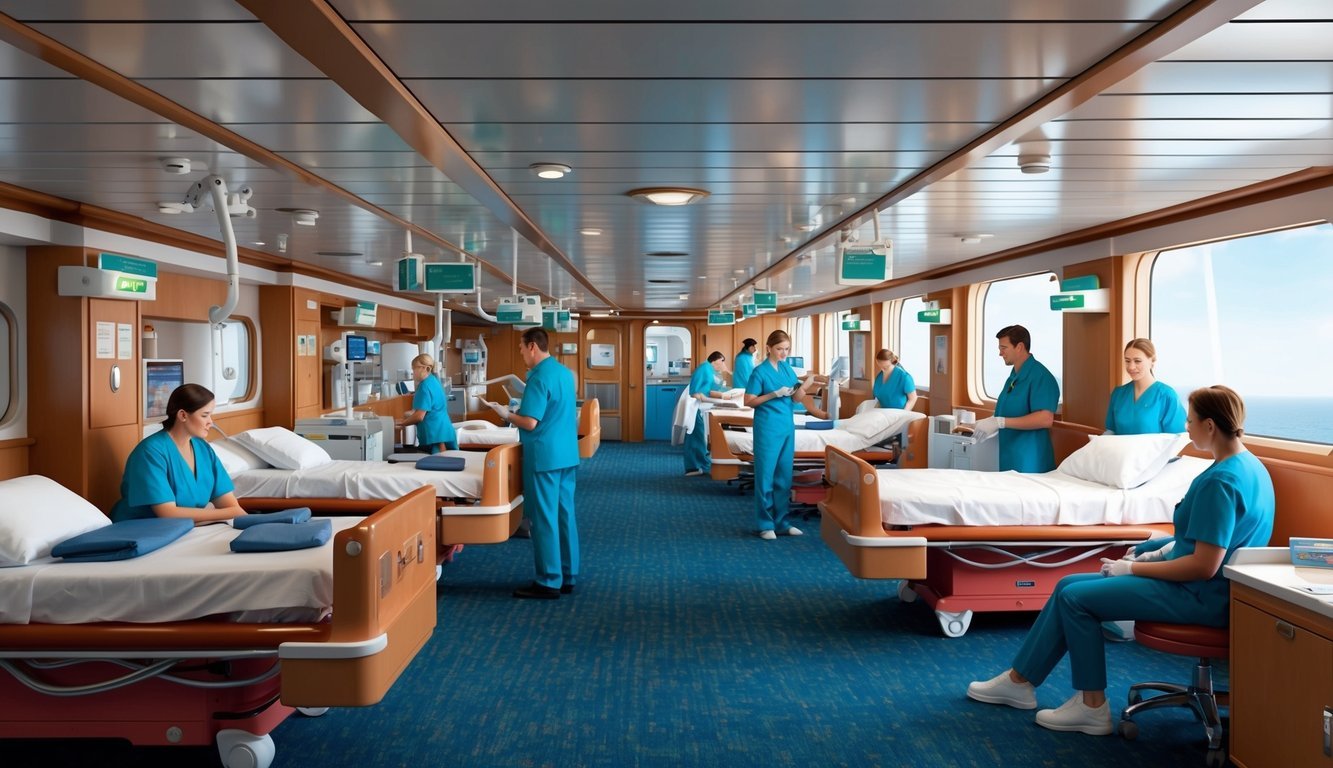As a cruise ship nurse, you have the opportunity to blend adventure with your medical career. The average cruise ship nurse salary is around $76,283 per year, but it can vary based on factors such as experience and the specific cruise line.
This unique role not only offers a competitive salary, but also the chance to explore various destinations while providing essential healthcare to passengers and crew.
Many nurses are drawn to this field for the combination of skills and travel involved.
Depending on your background and certifications, salaries can differ significantly, with entry-level positions starting at about $39,500 per year.
The lifestyle of a cruise ship nurse includes long hours and sometimes challenging conditions, yet the rewards can be substantial both financially and personally.
If you’re considering a change in your nursing career, a cruise ship position might be worth exploring.
Understanding the financial and professional aspects of being a cruise ship nurse can help you make an informed choice about this exciting option.
Key Takeaways
- Cruise ship nurses earn a competitive salary that varies by experience and cruise line.
- The role requires specific training and certifications for effective practice on board.
- Working on a cruise ship involves unique challenges but offers valuable life experiences.
Understanding Cruise Ship Nurse Roles

As a cruise ship nurse, you play a vital role in providing healthcare to passengers and crew.
Your responsibilities include ensuring patient care, managing emergencies, and adhering to maritime safety regulations.
Below are key areas that define what you need to succeed in this unique nursing position.
Qualifications and Credentials Required
To become a cruise ship nurse, you usually need an active Registered Nurse (RN) license.
Most employers prefer candidates with 2-3 years of clinical experience in areas like acute care or emergency medicine.
Additional certifications can enhance your qualifications, such as:
- Advanced Cardiovascular Life Support (ACLS)
- Pediatric Advanced Life Support (PALS)
- Training in critical thinking and communication skills
Some cruise lines may also require specialized courses in maritime safety regulations.
Meeting these qualifications ensures you are equipped to handle various medical situations.
Roles and Responsibilities
Your primary role is to provide medical care to passengers and crew alike.
Responsibilities include:
- Assessing and treating injuries and illnesses
- Administering medications
- Coordinating with first responders during emergencies
- Creating and maintaining patient care records
Effective teamwork is crucial.
You often collaborate with other healthcare staff and work alongside cruise line personnel to ensure a safe environment for everyone onboard.
You may also be required to provide health education to guests.
Work Environment and Conditions
Working on a cruise ship means being in a dynamic environment.
Your work area typically includes:
- A small medical facility equipped for basic and emergency care
- Cabin space for rest during shifts
You must be prepared to work odd hours, as emergencies can arise anytime.
Being away from home for extended periods can be challenging but also rewarding, allowing you to explore different ports of call during days off.
Required Certifications for Cruise Ship Nurses
To effectively manage emergencies and provide quality patient care, specific certifications are often required.
These may include:
- Advanced Cardiovascular Life Support (ACLS)
- Pediatric Advanced Life Support (PALS)
- Certification in maritime safety regulations
These certifications not only make you a more competent nurse but also increase your employability in the cruise industry.
Additionally, ongoing education in areas like emergency care and intensive care can be beneficial for your career.
Education and Training Pathways
To become a cruise ship nurse, you must follow certain educational and training requirements.
This includes completing a nursing program and obtaining relevant certifications.
You also need to gain clinical experience to enhance your skills and knowledge.
Nursing School Overview
You will typically start your career by enrolling in a nursing school offering a Bachelor of Science in Nursing (BSN).
This degree program usually takes around four years to complete.
In this program, you will take courses in anatomy, pharmacology, and patient care.
After finishing your degree, you must pass the NCLEX-RN exam to obtain your nursing license.
This exam tests your knowledge and readiness to practice as a registered nurse.
Once licensed, you can start your career in various nursing fields, including working on cruise ships.
Advanced Nursing Degrees
If you wish to advance in your nursing career, consider pursuing a Master of Science in Nursing (MSN).
An MSN can open doors to roles such as nurse practitioner or clinical nurse specialist.
Most MSN programs require you to have a BSN and relevant nursing experience.
Additionally, you will need to complete clinical hours and pass a certification exam.
Having an advanced degree can lead to higher salaries and more responsibilities.
Gaining experience in different settings will also be valuable.
While working, consider obtaining nursing certifications related to emergency care, which is crucial for cruise ship environments.
This combination of education and experience will prepare you for a successful career as a cruise ship nurse.
Cruise Ship Nurse Salary Insights
Understanding the salary of a cruise ship nurse involves looking at various factors that affect earnings.
These include the cruise line you work for, your level of experience, and even the cost of living in different regions.
Here are the insights into what impacts your salary.
Factors Influencing Salary
Several aspects determine how much you can earn as a cruise ship nurse.
-
Cruise Line: Different cruise lines offer varying salary packages. For example, larger companies like Royal Caribbean may provide higher salaries and better benefits compared to smaller lines.
-
Experience and Certification: Your qualifications play a significant role. Generally, nurses with more experience and specialized certifications can negotiate higher salaries.
-
Contract Length: The duration of your contract can also influence your pay. Longer contracts might offer better wages or bonuses.
-
Location: If you work in regions with a low cost of living, your salary might stretch further.
These factors combined help shape your total earning potential.
Comparative Salary Analysis
Cruise ship nurses earn an average salary that is often less than general registered nurses.
- Average Salary: As of 2024, the average salary for cruise ship nurses is around $84,470, while a cruise ship doctor can earn upwards of $233,908.
| Position | Average Salary |
|---|---|
| Cruise Ship Nurse | $84,470 |
| Cruise Ship Doctor | $233,908 |
| Cruise Ship Captain | $96,997 |
| Cruise Ship Dishwasher | $27,275 |
While the salary for cruise ship nurses may seem lower, the perks of travel and experience can add significant value to the job.
For more details on cruise ship nurse roles, visit NurseJournal.
Job Outlook and Career Advancement

As a cruise ship nurse, understanding the career paths and job prospects in this unique field is essential.
Opportunities for advancement exist, and the job outlook appears promising for registered nurses looking to expand their careers in a maritime environment.
Career Progression Opportunities
Cruise ship nursing offers various career advancement possibilities.
Starting as a registered nurse, you can gain experience that opens doors to higher positions.
Some may choose to specialize as a nurse practitioner or move into management roles on the ship.
Here are some potential paths:
- Specialized Nursing Roles: After gaining experience, you can focus on areas such as pediatrics or emergency care.
- Management Positions: With sufficient experience, you could become the head nurse, overseeing nursing staff and operations.
- Consulting Roles: Some nurses move into advisory positions, helping cruise lines develop their healthcare programs.
Each of these roles can enhance your skills and increase your salary potential significantly.
Job Outlook for Cruise Ship Nursing
The job outlook for cruise ship nursing is strong.
With the overall demand for registered nurses continuing to grow, the same applies to those in unique settings like cruise ships.
According to recent data, the healthcare sector, including nursing jobs, is expected to see a 6% growth from 2021 to 2031.
Key factors impacting this include:
- Increased Travel: As tourism rebounds, cruise lines will need more healthcare professionals onboard.
- Aging Population: An older demographic on cruises requires more medical care and support.
- Diverse Skills Required: Nurses with specialized skills are in high demand, making your nursing skills more valuable.
Overall, this field holds promise for those willing to adapt and grow in their nursing careers.
Contractual and Agency Considerations
When considering a career as a cruise ship nurse, understanding the contract and agency landscape is essential.
You will need to navigate various contractual obligations and the role of nurse staffing agencies in securing your position.
Understanding Cruise Ship Nurse Contracts
Cruise ship nurse contracts typically last around six months.
During this period, you may be required to work long hours, often exceeding standard nursing shifts.
Key elements to consider in your contract include:
- Salary and Benefits: Ensure you understand your pay structure. Many cruise nurses earn between $5,000 to $7,500 per month.
- Contract Commitment: Be clear about the commitment you are making. Some contracts can have penalties for early termination.
- Time Off: Contracts often specify your days off. Use this time wisely to explore new ports of call.
Always read through your contract thoroughly before signing.
Consider asking for clarification on any points that seem vague to avoid surprises later.
Working with Nurse Staffing Agencies
Nurse staffing agencies can help you find cruise ship positions that match your skills and preferences.
They facilitate the hiring process and may offer additional resources.
When engaging with an agency, keep the following in mind:
- Agency Fees: Some agencies charge fees for their services. Make sure to inquire about these in advance.
- Reputation: Research the agency’s reputation and reviews. Look for agencies specifically focused on cruise ship placements, as they have the most relevant experience.
- Support Services: Many agencies offer ongoing support, including help with travel arrangements and contracts.
Working with a reputable agency can simplify your journey into cruise ship nursing.
For more information, you may visit NursingProcess.org to find out more about the pros and cons of this career.
Daily Life and Challenges on a Cruise Ship

Working as a cruise ship nurse comes with unique daily challenges.
You handle medical emergencies, care for passengers dealing with seasickness, and must possess specific skills to ensure safety and well-being while at sea.
Addressing Medical Emergencies at Sea
As a cruise ship nurse, you must prepare for medical emergencies that can arise unexpectedly.
These can include heart attacks, injuries from falls, or severe allergic reactions.
Quick patient assessment skills are crucial.
You will use Basic Life Support (BLS) techniques and must know how to manage critical situations with limited resources.
Your ability to assess the severity of a situation dictates the response time.
Training in maritime safety will enhance your readiness.
Emergency drills are part of your routine to ensure that you and the crew can act efficiently.
You must remain calm and collected when faced with emergencies.
Continuous health education is essential not just for you but also for staff onboard.
Seasickness and Passenger Care
Seasickness is a common issue for many passengers.
Symptoms can include nausea, dizziness, and vomiting.
As a cruise ship nurse, your role is to provide care and relief measures for affected passengers.
You might recommend over-the-counter medications or natural remedies, like ginger.
Additionally, education on preventive measures is vital.
Informing guests about maintaining hydration and choosing proper meal options helps minimize discomfort.
Regular communication with passengers about their well-being is also essential.
Your ability to assess individual needs will help provide tailored solutions.
Establishing rapport can significantly ease their anxiety.
Skills for Success as a Cruise Ship Nurse
To thrive as a cruise ship nurse, specific skills are essential.
Your RN license should ideally be complemented by additional certifications related to emergency response, such as BLS.
Time management is critical due to the unpredictable nature of passenger needs.
You will frequently have to triage patients based on urgency.
Being organized helps you handle multiple responsibilities effectively.
Interpersonal communication skills also play a significant role.
You interact with diverse passengers and crew members.
Thus, establishing trust and rapport is crucial in providing the best care possible.
Your experience in acute care, preferably with an Associate Degree in Nursing (ADN) or higher, equips you with the knowledge to deal with various health issues that arise onboard.
Maintaining a proactive approach in your practice ensures you are ready for any challenge.
Frequently Asked Questions

In this section, you will find detailed answers to common inquiries regarding the salary and work conditions for nurses on cruise ships.
Understanding these aspects can help clarify what to expect in this unique nursing career.
What are the typical salary ranges for nurses working on cruise ships?
Cruise ship nurses typically earn between $39,500 to $77,600 annually, depending on their experience and the cruise line.
Entry-level nurses can start at about $18.99 per hour.
With experience, hourly rates can increase to around $50.00 per hour.
How does the compensation for nurses on Royal Caribbean cruise ships compare to other cruise lines?
Royal Caribbean generally offers competitive pay for its nurses.
While exact figures can vary, their compensation often aligns with or exceeds industry standards.
Cruise lines may offer additional perks like free room and board during contracts, influencing overall earnings.
Are there specific qualifications required to become a nurse on a cruise ship?
To work as a cruise ship nurse, you need a nursing degree (associates or bachelor’s) and an active RN license.
Many cruise lines prefer a Bachelor of Science in Nursing (BSN).
Experience in emergency care or acute settings is also highly valued.
What is the monthly income for a nurse working aboard a cruise liner?
Monthly income for cruise ship nurses can vary significantly based on experience and contract terms.
Generally, you might expect to earn between $3,290 and $6,467 monthly, depending on your role and hours worked.
Can you describe the career path for a nurse on a cruise ship, including potential for advancement?
Starting as an entry-level nurse, you can gain experience and move into advanced positions, such as senior nurse or healthcare manager.
Opportunities for promotion exist based on your performance and experience on board.
Networking with other healthcare professionals also helps in advancing your career.
What are the challenges associated with securing a nursing position on a cruise ship?
Securing a nursing job on a cruise ship can be competitive.
Many applicants seek to travel while working, which increases the number of candidates.
Additionally, you may face lengthy hiring processes and need to prove your readiness for the unique challenges of working on a ship.

